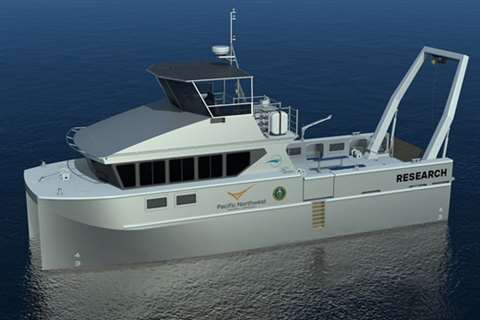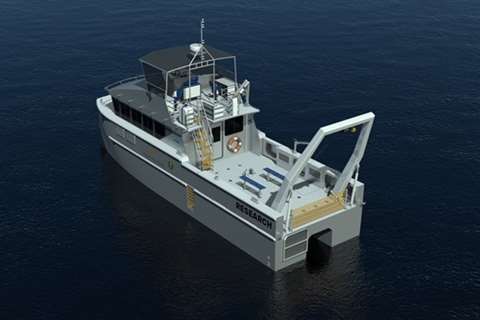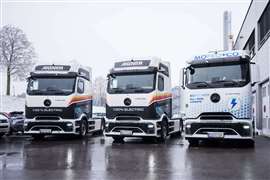Danfoss powers U.S. DOE’s first hybrid-electric research vessel
14 December 2022
 The 50 ft. Resilience hybrid-electric research vessel will be powered by twin Volvo Penta D8-510 diesel engines plus two Editron electric permanent magnet motors. (Photo: Danfoss)
The 50 ft. Resilience hybrid-electric research vessel will be powered by twin Volvo Penta D8-510 diesel engines plus two Editron electric permanent magnet motors. (Photo: Danfoss)
Danfoss Power Solutions’ Editron division announced it has been selected by the Pacific Power Group and Seattle, Wa.-based vessel builder Snow & Company to provide the drivetrain system powering the U.S. Department of Energy’s (DOE) first hybrid-electric research vessel, the R/V Resilience. The project is a result of the partnership between Snow & Company, Pacific Power Group, Volvo Penta, Spear Power Systems and the Editron division.
Due to be in operation in February 2023, the Resilience will be used by Pacific Northwest National Laboratory (PNNL)-Sequim for testing and research needed to support ocean-derived renewable power and supporting PNNL-Sequim technologies. It includes laboratory space with multiple science stations, a large deck, an A-frame and a knuckle crane that will be used to deploy research equipment, remotely operated vehicles (ROVs) and diving operations in support of various research projects.
The 50 ft. vessel designed by Incat Crowther has a 55,000 lb. displacement and will be powered by an advanced parallel hybrid-electric propulsion system consisting of twin 7.7 L Volvo Penta D8-510 in-line six-cylinder diesel engines rated 374 kW (510 hp) each plus two 20 kW Editron electric permanent magnet motors. The Editron division will provide the complete system delivery of the electric drivetrain, including the DC grid, power and energy management systems, electric PM-motors and PM-generators and compact and lightweight inverters and DC/DC converters.
Propulsion integration will be provided by Pacific Power. ”Pacific Power Group is excited to have been selected by Snow & Company and PNNL to be a key partner integrating Volvo Penta and Danfoss’ Editron division’s solutions forming a seamless hybrid propulsion system,” Bill Mossey, president at Pacific Power Group, stated. “It’s especially exciting to be engaged in a project that will be part of learnings and further development towards decarbonizing marine propulsion systems. We are honored to be part of this highly capable team.”
 The electric motors will be used when conducting slow-speed research work for longer durations of up to six hours, providing nearly silent, zero-emissions operation. (Photo: Danfoss)
The electric motors will be used when conducting slow-speed research work for longer durations of up to six hours, providing nearly silent, zero-emissions operation. (Photo: Danfoss)
The diesel engines will be used when cruising at fast speeds up to 20 knots and over long ranges up to 3000 nautical miles. The electric motors will be used when conducting slow-speed research work for longer durations of up to six hours on a single charge. In addition, the electric motors will be able to charge the energy storage system aboard the vessel. Power will be stored using a Spear Trident battery system.
When operating in battery electric mode, the Resilience will be nearly silent with zero emissions, making it less intrusive for studying fish and other wildlife while reducing air pollution and carbon dioxide emissions.
“It is an honor to be chosen to work with this prestigious institution, where our contribution will enable the research needed to achieve further sustainable developments,” Erno Tenhunen, marine director of Danfoss’ Editron division. “This project shows the potential that hybrid power can unlock by enabling more flexible operations. Being equipped with both a diesel and electric motor, the vessel will be able to operate either at high speeds and long ranges, or more quietly and energy efficiently for longer durations.”
The hybrid research vessel project is being funded by the U.S Department of Energy’s Water Power Technologies Office as part of a $7.1 million USD marine energy infrastructure fund awarded to seven projects across five DOE national laboratories.
POWER SOURCING GUIDE
The trusted reference and buyer’s guide for 83 years
The original “desktop search engine,” guiding nearly 10,000 users in more than 90 countries it is the primary reference for specifications and details on all the components that go into engine systems.
Visit Now
STAY CONNECTED




Receive the information you need when you need it through our world-leading magazines, newsletters and daily briefings.
CONNECT WITH THE TEAM













